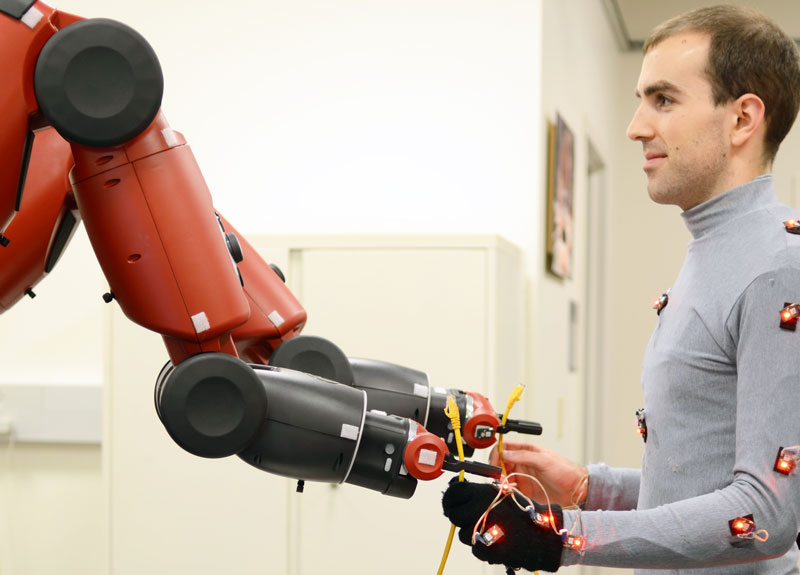
Robohub.org
National Science Foundation and federal partners award $31.5M to advance co-robots in US

The Baxter robot hands off a cable to a human collaborator — an example of a co-robot in action. Photo credit: Aaron Bestick, UC Berkeley.
From disaster recovery to caring for the elderly in the home, scientists and engineers are developing robots that can handle critical tasks in close proximity to humans, safely and with greater resilience than previous generations of intelligent machines.
Today the National Science Foundation (NSF), in partnership with the National Institutes of Health, US Department of Agriculture and NASA announced $31.5 million in new awards to spur the development and use of co-robots — robots that work cooperatively with people.
The awards mark the third round of funding made through the National Robotics Initiative (NRI), a multi-agency program launched in September 2012 as part of the Advanced Manufacturing Partnership Initiative, with NSF as the lead federal agency.
“Robots and robotic systems have the potential to augment human abilities, improve our quality of life and perform dangerous tasks unsuitable for people,” said Suzi Iacono, acting assistant director of the Computer and Information Science and Engineering Directorate at NSF. “Working with our federal partners in NRI has spurred new research directions that weren’t previously possible without these collaborations.”
The 52 new research awards, ranging from $300,000 to $1.8 million over one to four years, advance fundamental understanding of robotic sensing, motion, computer vision, machine learning and human-computer interaction. The awards include research to develop soft robots that are safer for human interaction, determine how humans can lead teams of robots in recovery situations and design robots that can check aging infrastructure and map remote geographic areas.
A full listing of the NRI investments made by NSF is available on the NSF’s NRI Program page.
The NRI awards address the entire development cycle of robots, from fundamental research to deployments in critical environments, and will help make safe, helpful and affordable co-robots a reality.
“Our engineers and scientists are creating a world where robotic systems serve as trusted co-workers, co-inhabitants, co-explorers and co-defenders,” said Pramod Khargonekar, assistant director of NSF’s Engineering Directorate. “The National Robotics Initiative serves the national good by encouraging collaboration among academic, industry, non-profit and other organizations — and by speeding creation of fundamental science and engineering knowledge base used by researchers, applications developers and industry.”
NSF’s investments in robotics explore both the technical and engineering challenges of developing co-robots and the long-term social, behavioral and economic implications of co-robots across all areas of human activities. As part of the initiative, NSF also supports the development of new methods for the establishment and infusion of robotics in educational curricula.
Earlier this month, NRI announced its latest solicitation, which has been joined by the Defense Advanced Research Projects Agency (DARPA) and the Department of Defense as new partners. The program expects to award up to $50 million in 2015.
If you liked this article, you may also be interested in:
- Japan holds first “robotics revolution” council meeting
- £1.25M advanced drone lab gets the go ahead
- China takes long view in funding robotics, innovation
- EU launches world’s largest civilian robotics programme – 240,000 new jobs expected
- Swiss to invest almost CHF30 million in digital fabrication research over next 4 years
- Robot tourism coming soon to Korea: Masan Robot Land project finally breaks ground
See all the latest robotics news on Robohub, or sign up for our weekly newsletter.
tags: c-Research-Innovation, cx-Politics-Law-Society, NRI, NSF, US investment in robotics




